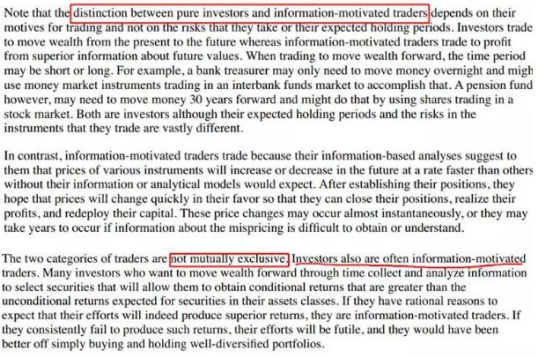在CFA一级考试中权益投资在考试中的占比不是太大,考生不能掉以轻心,那对于CFA这个知识点你掌握的怎么样呢?在考试备考中考生对这道题不是太理解,那是哪一道考题呢?今天融跃老师给你说说!
【试题】:Information-motivated traders are most likely to differ from pure investors in that they:
A. hold well-diversified portfolios.
B. pay lower transaction fees.
C. expect to earn excess returns.
【答案】:C is correct.
Information-motivated traders expect to earn returns in excess of market returns because they trade on securities they believe the market has over- or undervalued. Unlike pure investors, they expect to earn a return on their information in addition to the normal return expected for bearing risk. Excess returns are generated when the market recognizes and corrects the valuation error on such a security.
可能大家对原版说上的解析不是太理解,今天融跃老师给你说说为什么是这样的!
【解题思路】:
老师认为协会原版书对于这两类市场参与者的区别解释的比较清楚,把它贴上来大家可以先自行阅读一下,在图片下面会进行详细的解释:

老师理解这段话的意思是说pure investors可以看作是一帮有钱人(有产阶级),通常这帮人都没有投资经验,但是希望通过投资实现资产的保值增值(move wealth from now to future),所以他们只能被动的进行投资并获得fair return。
而information-motivated trader,是一帮自认为可以获得其他人没有的信息并且具备分析和处理信息的能力的人,他们相信分析结果可以帮助他们找到被低估或被高估的股票,并从中获得超额收益。但这部分英文的第三段可以看出,这两者并非互斥的两个群体,pure investors是一个更加广义的分类,而information-motivated trader只是它的子分类,他们主要的区别体现在他们对于实现超额回报的信心上(zui后一段)。
如果对于实现超额回报有信心(相信自己有信息且有研究信息的能力),那么他们就是information-motivated trader。如果没有信心,而且长期来看都获得不了什么超额回报,那不如就退回去被动的投资大盘指数(持有一个完全分散化的组合,例如买指数基金,ETF股指期货等),也就是一名普通投资者经常做的。因此这道题让我们选两者的不同点,那么就应该选C,他们对于实现超额收益的预期不同。
【易错点分析】:
大部分拿到这道题的同学都感觉无从下手,其实就是对information-motivated trader和pure investors没有一个很清晰的认识。我们从协会的原文中也可以看出information-motivated trader只是普通投资者的一个子分类。











